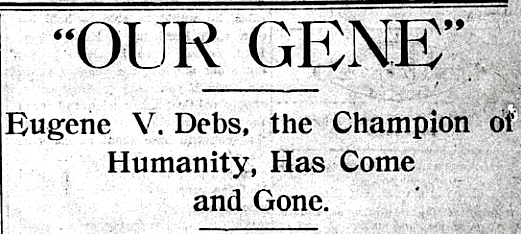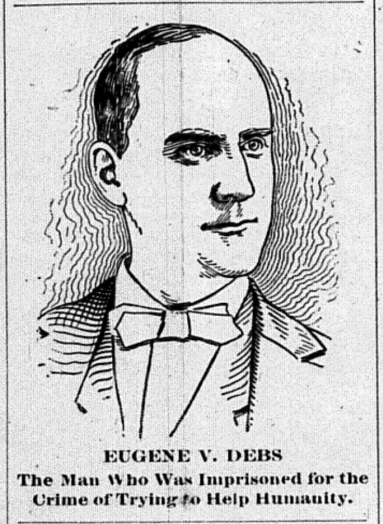 ———-
———-
Hellraisers Journal – Thursday July 6, 1899
Duluth, Minnesota -“Our Gene” Speaks at the Armory
From the Duluth Labor World of July 1, 1899:
Eugene V, Debs, accompanied by L. W. Rogers, one of the men who was incarcerated in Woodstock prison with Mr. Debs, arrived in Duluth Wednesday morning from West Superior, where he addressed a large audience the evening before [June 27th]. Mr. Debs spoke to a large, assemblage at the Armory in the evening [June 28th]. When the noted orator appeared and commenced his address unannounced, it being his wish that everything should be done in the most simple manner, there was literally a storm off applause.
Mr. Debs has, a striking personality. His smooth-shaven face is full of force of character. His firm jaw speaks of his will and energy which makes him a leader among men. His eyes are sharp and piercing, yet their expression is gentle and kindly in the extreme. He is a forceful speaker. His talk is an elevating one and if any man ever preached the true Christianity and the brotherhood of man, those eternal doctrines were discussed by Eugene V. Debs.
Mr. Debs was listened to with rapt attention. Not a word was lost, and the bursts of applause that came at frequent intervals not only were expressive of the appreciation by the audience of the thought and eloquence of the orator, but also of his personal admiration of this great man—a giant in intellect among his fellows-a leader able to stand comparison with the foremost men of the race and generation and withal of such binding magnetism, such tender sympathy, such lofty and inspiring sentiment that his incarceration in the Woodstock dungeon forces itself upon the thinking mind as the most powerful indictment, the most convincing evidence of the corruption and brutal tyranny of the corporate despotism that now dominates American institutions.
The enthusiasm continued all during the meeting, and it not only testified the great esteem in which Eugene V. Debs is held by the thinking people of America, but that he still retains the old-time love, honor and respect of his Duluth friends.
A remarkable feature of the meeting was the earnestness of the audience. When Mr. Debs was speaking, except when his eloquence aroused a roar of applause, the audience was so quiet that the slightest noise, aside from the speaker’s voice, was painfully audible. Debs was speaking truths, and they struck each of his auditors to his inmost consciousness. His word pictures of the abject condition of the toilers and the triumph of plutocracy were most graphic. It was small wonder that his listeners were in earnest and smaller wonder that they cheered the speaker. That Eugene V. Debs is the foremost man of today; that time will but tell the now unknown greatness of this man there is no use denying.
One cannot listen to Eugene V. Debs and take his words down at the same time with any degree of satisfaction, so our readers will pardon our brief report of his speech which follows:
“Ladles and Gentlemen,” he said, in beginning his lecture,
nothing is more certain today than that the doom of the present competitive, capitalistic system is sealed and that it is coming to a speedy dissolution. A new social order is upon us. Over a century ago our fathers declared in favor of political equality and now, we are soon to enjoy both political and economic equality.
Mr. Debs then went into a detailed argument showing how the modern inventors had driven labor out of many fields of employment and arguing that it and the combination of capital, and the competitive system had made slaves of the laboring men. He alleged that it was only under the competitive system that men could amass great wealth and contended that they were not entitled lo it.
[He said:]
I am opposed to the system, a system which allows one man to accumulate more than he can use, while so many suffer from the barest necessities of life.
He went back to the days of Jefferson and Washington, before any of the great inventors of today were known and reviewed the advance in labor saving devices, using it as an illustration of how labor has, as he expresses it, been robbed of its just dues. He declared that the competitive system was responsible for the reduction of miner’s wages from an average of $4 per day to an average of 75 cents and in an effort to show that railroad employes have also suffered through the invention of larger engines, which haul heavier trains. The speaker stated that Edison had recently said that in 20 years machinery would be doing the work of the world.
Mr. Debs declared that the present prosperous times were wholly artificial. He characterized the reports of prosperity as false and in support of his argument spoke of numerous strikes that have recently taken place.
[He said:]
It is a mockery to claim prosperity when coal miners are working for an average of 75 cents a day; when a want ad in Chicago will bring response from hundreds of intelligent, capable men, some of them college graduates, willing to work for $1.25 per day; when the army of tramps is increasing ten fold year by year. When one class is growing smaller and richer and the other larger and poorer.
Mr. Debs declared that he was not opposed to trusts, in the sense that others were. He was opposed to the competitive system and in so far as the trusts were driving this system out he favored them. He believes that the trusts will ultimately prove to be the salvation of the laboringman. That the trust is only one step from socialism.
He spoke against the war in the Philippines which he declared was waged in the desire for commercial supremacy only. This brought him into a discussions of the Spanish war and brought forth some scathing remarks in regard to it, in which he said that he was against the war-against any war and declared that when socialism became the order of the day there would be universal peace.
He roasted all politicians and political parties. Said that the money questions was a dead issue and believed that trusts and expansion will be the issues brought prominently before the people in 1900; but warned his hearers to pay no attention to them, declaring it to be only a political snare. He then drifted into a discussion of Rockefeller, Carnegie and others, who have accumulated great wealth and devoted considerable time in arguing that none of them were entitled to their immense property, and before he finished he was discussing all business men.
[Said the speaker:]
No two business men in Duluth, trust each other. They may go to the same church and attend the same prayer meeting, but business is business and that’s where honesty ends. “Do unto others,etc.,” but do him first is their motto.
He declared himself as opposed to the wage system and said he could see no reason why one man should work for another, why one man should make a profit out of another’s labor. He said that he firmly believed that this system would soon be a thing of the past, however, that the world was today trembling on the verge of one of the greatest changes ever known.
He declared that the middle class is doomed and cited many reasons for that belief and closed his address by a prophecy that socialism would triumph before the next ten years had passed away.
A 15 minute reception was held by Mr. Debs after the lecture when he met and spoke a word or two with a large number of people. He left at 11:15 last night for Madison, S. D., where he has two Chatauqua engagements which will close the lecture tour for this season.
———-
[Photograph and emphasis added.]
~~~~~~~~~~~~~~~~~~~~~~
SOURCE
The Labor World
(Duluth, Minnesota)
-July 1, 1899
https://chroniclingamerica.loc.gov/lccn/sn78000395/1899-07-01/ed-1/seq-1/
IMAGE
EVD, Sc Dem Hld p1, July 1, 1899
https://www.marxists.org/history/usa/pubs/social-democratic-herald-us/990701-socdemherald-v02n02.pdf
See also:
L. W. Rogers
https://en.wikipedia.org/wiki/L._W._Rogers
Corporate Trusts
https://en.wikipedia.org/wiki/Trust_(business)
Re Chautauqua
https://en.wikipedia.org/wiki/Chautauqua
Re Chautauqua Circuit
Letters of Eugene V. Debs, Volume 1
-ed by J. Robert Constantine
(search: chautauqua)
University of Illinois Press, 1990
https://books.google.com/books?id=6i3PS8RLEygC&source=gbs_navlinks_s
Re Socialist Encampments
The Socialist Party of America
A Complete History
– Jack Ross
U of Nebraska Press, Apr 15, 2015
(search: encampment)
https://books.google.com/books?id=360oDwAAQBAJ
~~~~~~~~~~~~~~~~~~~~~~~~~~~~~~~~~~~~~~~~~~~~~
Banks of Marble – Pete Seeger
Lyrics by Les Rice
http://unionsong.com/u024.html


